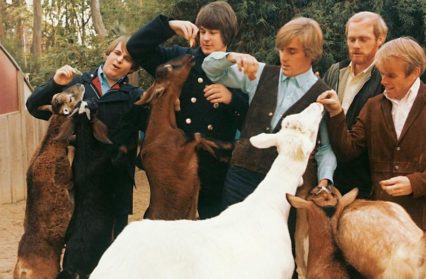Kevin McGrath pays tribute to Pet Sounds on the fiftieth anniversary of the release of one of rock music’s most influential albums.
On May the 16th 1966 The Beach Boys released Pet Sounds (incredibly, their eleventh studio L.P. in under four years!), a star-spangled suite of songs that changed the face of rock ‘n’ roll forever. The record, though, came as a shock to the nonplussed sales team at Capitol Records, expecting, no doubt, another identikit album spawned by a surf-rock franchise that had already racked up a string of top forty singles for LA’s favourite teen icons. When Capitol discovered that the band’s wunderkind, Brian Wilson, had delivered a uniquely introspective song-cycle that came, not with an obvious hit single, but with an imminent profit warning, they considered shelving the album altogether. Finally, an uneasy compromise was reached with the label insisting that Pet Sounds include rhythm guitarist Al Jardine’s striking re-interpretation of an old folksong, “Sloop John B”, which had been a top 5 hit for the group earlier in the year.
The 23 year old Wilson, inspired and unnerved in equal measure by the ‘unity’ of The Beatles’ 1965 album Rubber Soul, had resolved to respond in kind by penning ‘the greatest rock album ever made’. Foreseeing (with a nudge and a wink from across the Mersey) that the long-playing pop record could be more than just a bunch of hit singles surrounded by hapless filler, Wilson summoned advertising exec and part time jingle writer, Tony Asher, to ghost-write Pet Sounds while the rest of the group were on the road in Japan. Sure enough, the re-cycled surfer-slang that had brought the band’s sun-kissed symphonies to life (re-affirming the splendour of the American dream in the process) had been cast aside as Wilson sought to capture ‘a spiritual love that couldn’t be found anywhere else in the world’. In their place, songs like “I Know There’s an Answer” and “I Just Wasn’t Made for These Times” anticipated the collective downer that would follow in the aftermath of 1967’s short-lived summer of love, as the first baby boomers began to question the lengths America would go to in its expansionist pursuit of happiness.
Wilson’s urgent reinvention of the band’s sun-blessed sound wasn’t a smart move in terms of immediate record sales, however, (by peaking at No 10 on the Billboard Charts, Pet Sounds fell short of gold status and was deemed a commercial flop as a result), and it divided the leading rock critics stateside, too (although it fared much better here, where Lennon and McCartney were among the living legends attending its unveiling in London’s Waldorf Hotel). It wasn’t a particularly smart move in the eyes of his band mates, either, with Mike Love describing Wilson’s graduation from being a composer of sophomoric “car songs” to a more mature, confessional songwriter as ‘nauseating’.
Pet Sounds was, of course, a solo record in everything but name. In his role as musical director, Wilson envisaged Pet Sounds as being first and foremost a ‘production concept’ album. In marrying together the tried and trusted tropes of Tin Pan Alley songcraft with state-of-the-art technology (taking his cue from the sonic boom of Phil Spector’s Wall of Sound), Wilson set new standards for meticulous and complex arrangements, utilising everything from an electro-theremin to a bicycle horn and a water jug! In addition, Wilson composed every bar of Pet Sounds’ twelve original tracks and sang lead vocal on seven of its thirteen numbers. Capitol, still dismayed by the album’s lack of sure-fire surf-pop hits, released the single “Caroline, No” under Wilson’s own name, while rushing out a Beach Boys greatest hits package to compensate for the financial hit they were expecting to take. Brian Wilson’s relationship with Capitol ended when he filed a $2 million lawsuit against them for unpaid producer’s royalties and they responded by deleting most the band’s back catalogue!
Yet, as the world marks the fiftieth anniversary of the album’s release, Wilson’s majestic opus is to be found regularly vying for top spot in music industry polls for ‘The Greatest Album of all Time’ alongside the likes of Revolver, What’s Going On and Astral Weeks. Pet Sounds has lost none of its lustre in the intervening years, remaining as fresh and fanciful as it ever was; combining breathtaking harmonies, audaciously conceived arrangements and supreme musicianship (courtesy of the legendary Wrecking Crew), it’s a record sprinkled, like no other in the history of pop, with pure songwriting stardust. How else to explain the impossible grandeur of “You Still Believe In Me”, “God Only Knows” and “Caroline, No”?
Through the years, listening to Pet Sounds has often reduced Paul McCartney to tears, but he recovered his poise quickly enough at the time of its release and returned serve with the imperious Sgt Pepper’s Lonely Hearts Club Band (1967). A damaged Wilson responded to the Fab Four’s great leap forward by abandoning Smile, his mystical “teenage symphony to God” and retiring to the solitary confinement of his indoor sandpit. Within two years, having succumbed to a massive drug habit, he’d been committed to a Psychiatric hospital for intensive therapy. Brain Wilson was able to return, periodically, to his role as Commander-in-Chief of the Beach Boys and the group went on to record other fine albums in Sunflower (1970) and Surf’s Up (1971) on which Dennis Wilson began to share some of the songwriting burden with his shell-shocked brother.
It’s almost impossible to overstate the importance of Pet Sounds in the rock canon, enshrining, as it did, the pop album as an art-form in its own right. It’s a singular achievement, one that stands as a sublime testimony to ambition and imagination on a grand scale. Five decades down the line no other artist has come close to making a pop record as graceful, as groundbreaking or as gladdening as Pet Sounds.












